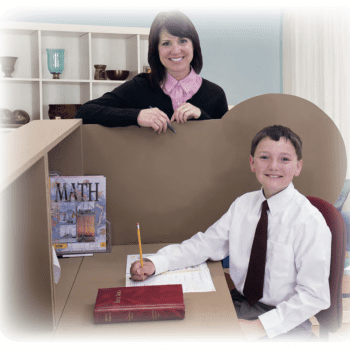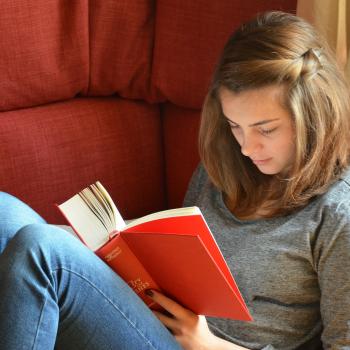Why and when did your parents originally decide to homeschool? Did their reasons for homeschooling change over time?
Joe:
My family knew nothing about homeschooling until we met the esteemed, Bill Gothard. Then, when Mama fell in love with every word that dripped off his tongue, she viewed his homeschooling program as the only program worth belonging to. Little did I know this would be a huge blessing in my life. I considered it a curse at the time, as you will soon see.
In 1992, Bill Gothard required the board of the Advanced Training Institute to approve families that desired to enter into his homeschooling program. This made sense because, according to his program’s strict standards, their could be no bad apples. Thus, my family received scrutiny from the board due to our horrible evil condition of being seven children with a single mother. Gasp! We were eternally marred by divorce. The board required a bunch of signatures to vouch for us as being good people and worth their time. Then, they required us to get our father’s approval. My dad would have nothing of it. He knew how abusive and horrid Mama was to us and didn’t want her to have complete control of our lives 24/7. The board rejected our application.
I wept. I was twelve.
My mother never attempted again and, instead, wore the badge of a martyr for the cause – whatever cause that was. From that day forward, all the Mama approved “testimonies” we had to recite in front of church people made some mention of how our father stopped us from homeschooling.
I heard the stories so many times as I was growing up, the reasons for my parents’ decision to pull me out of public school halfway through first grade and start to homeschool me. I heard how I cried every day when my mom dropped me off at school. I heard how I was bored in class because I had learned to read at age three, long before going to kindergarten. I heard how my teacher was wasting classroom time on political issues by having the class write a letter about saving some whales. I heard how the teacher hurt my feelings badly by insulting my quiet speaking voice during a presentation. I heard how I had the problem boy as my seatmate because I was the best behaved student. I never thought to question my mom’s narrative; school was certainly a terrible place for me, based on her stories.
As a former elementary school teacher, my mom knew that she could give me a more personalized education than I would get in a classroom of 30 other students. While helping me get ahead academically, she would also be able to protect me from worldly and liberal influences.
Unfortunately, after many years of countering criticism and being surrounded by other like-minded Christian homeschoolers, my mom lost the ability to objectively evaluate whether homeschooling was still working for our family. By then, our identity as homeschoolers was inseparable from our spiritual, political, and family identity; failure was not an option.
My parents originally decided to homeschool for purely practical reasons, and they only planned on doing it for a year. But that first year went so well they did another, and another. Meanwhile, they began reading Christian homeschool literature, attending Christian homeschool conferences, etc. By the time I was ten my parents were homeschooling us because they believed that the public schools brainwashed children into “secular humanism” and turned children into unthinking robots, and because they believed, based on Deuteronomy 6, that it was the responsibility of the parents, and not the state or anyone else, to educate their children. Homeschooling had moved from being a practical and temporary option to being a lifestyle.
Lisa:
My parents said that they always wanted to homeschool us kids. I as the oldest have never seen a public school from inside. My Dad was convinced that public schools were filled with sin (sex and drugs) and that they enforced certain “agendas” on the students. It got worse over time, my Dad thinking that all the bad things in America are rooted in the pro-gay pro-choice pro-everything ungodly schools.
As I mentioned before, my parents always planned to homeschool. They felt that they, and no one else, were responsible for their children’s education (referencing Deuteronomy 6:7). Education is inseparable from faith, in their minds, and this was something they believed was a responsibility and a calling from God.
Originally, I remember my Dad talking about choosing homeschooling because he had hated being in school. He had always felt as if he had been held back and had never fit in well with the other kids. My parents saw an article about homeschooling in the newspaper and decided to try it. As time went on there were more reasons, such as protecting us from the disbelief and propaganda in the schools, and keeping us girls safe from unsupervised interactions with men/boys. I remember them talking about how we would waste so much time in school, learning stuff that we would never need for life, whereas if we were at home we could learn about caring for children and cooking and cleaning, all things my mom had felt inexperienced in when she started her family.
My dad had serious problems in school as a kid. He was very intelligent and found the structure of school to be oppressive and a hindrance. When my parents first heard about homeschooling they were very excited to have found an alternative. My dad wanted us to have academic freedom, and my mom wanted us to be safe from the world. Their goals converged over time.
My mother decided to homeschool me because I was terrified of school. I was in kindergarten for three months in a room with an aging, unsympathetic teacher and a bunch of rowdy boys who bullied me. I was a sensitive child, and couldn’t handle it. I had insomnia, horrible nightmares, anxiety attacks, random fits of crying, and was generally miserable. I was also a gifted child who had known how to read for three years and was bored to death by the lessons we were doing. My mother (prudently, I think) decided to take me out of school for a year and let me mature a little bit before being put back in that environment. Then my mother met a fundamentalist and hit it off with her (as I hit it off with her son, Sven) and we were sucked into that family’s church. Once we were part of the Christian Patriarchy movement, my mother’s reasons for homeschooling me changed from getting me a head start academically and letting my social skills catch up to protecting me from worldly influences.
<<< Previous Question ———————————— Next Question >>>














